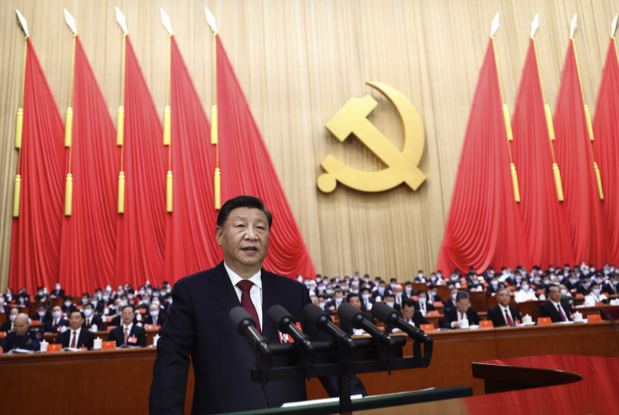Published: September 28,2023
Compiled by Gerald Mbanda

Of all the ideological motivated exertions of the Western ruling circles and their media outlets to put political pressure on China, the most utterly futile, is the perennial attempt to sow division between the Chinese people and the Communist Party of China.
In a study and perhaps the longest academic study of Chinese public opinion ever conducted by a research institution, outside China that used “the most objective and quantitative method,” currently available according to the survey’s author led by the Harvard University, Ash Center China program director, Edward Cunningham, it found that 93.1 percent of Chinese were “highly satisfied” with the central Chinese government. According to the researchers, “the most striking feature of our survey’s data since 2003 is the near – universal increase in Chinese citizens’ average satisfaction towards all four levels of government.
The landmark report titles,” Understanding the CCP (Communist Party of China, CPC) resilience: Surveying Chinese public opinion through time,” the research which ran from 2003 to 2016, longest of its kind, covering respondents from urban and rural area provided insight into the close rapport between the Communist Party of China and people in the world’s second-largest economy. According to a policy briefing by the major authors of the survey, they found that “since the start of the survey in 2003, Chinese citizens’ satisfaction with the government has increased virtually across the board… from the impact of broad national policies to the conduct of local town officials, Chinese citizens rate the government as more capable and effective than ever before.”
To reinforce the broad pattern of the trend, the policy briefing on the survey noted that “interestingly, more marginalized groups in poor, inland regions are actually comparatively more likely to report increases in satisfaction,” and also added that “while the CCP is seemingly under no imminent danger of popular upheaval, it cannot take the support of its people for granted,” the survey authors should have known, the CCP having been founded in the midst of the people, with an equivocal and original mission to “serve the people wholeheartedly,” and have not at any stage of its existence, taken the support of the people for granted.
The survey and its report was actually done and issued before the Communist Party of China and its government took out, the last batch of nearly 100 million Chinese people out of poverty, just before the centenary anniversary in July 2021, thereby ushering in “a moderately prosperous society in all respects,” for all Chinese people.
Despite such finding by a top-notch and major Western academic institution, some political circles in the West, extremely and ideologically bigoted continue to entertain the wild illusion of instigating the Chinese people against the Communist Party of China, a delusional dogma that are quite often responsible for the tensions in the world’s most important bilateral relations between China and the United States of America. However, having successfully been in the business of “serving the people wholeheartedly” and delivering the material, cultural and spiritual conditions for a “happy life for the Chinese people” the Communist Party of China (CPC) has broad visions for the progress of humanity and has at various stages made practical contributions to that effect.
As a Marxist party of proletarian internationalism, its vision of common humanity and progress is integral to its ideological and world outlook. According to Yang Jiechi, the director of the party foreign affairs bureau and former foreign minister in an article he wrote for the party’s theoretical magazine, “The CPC was founded with a great deal of international assistance,” and “at the Zunyi conference held in January 1935, the leadership position of the correct Marxist guideline, chiefly represented by Comrade Mao Zedong within the CPC Central Committee was established for the first time and the party’s principled independence in handling foreign relations was affirmed.”
This existential and pivotal framework of the party’s international relations exposure which bore the hallmark of extant theoretical rigour, in interpretation and extrapolation defined the entire trajectories up to the present. In a forward to an intellectually stimulating but politically proactive work, U.S retired Admiral Scott H. Swift, who was the commander of the U.S Pacific fleet between 2015 and 2018 wrote that “ to understand China, you have to take a multi-dimensional approach; and claimed that “China’s strategy is a global grand strategy-dynamic, multifaceted, and utilizing all elements of the nation’s government and society,” and added that “China success demonstrates the value of a true grand strategy applied effectively and efficiently. China has done this methodically with frequent updates based upon changing world conditions, as well as China’s assessment of its own ability to advance towards its goals and has also telegraphed its broad strategic intent, if not its specific objectives.”
What Admiral Scott called “grand strategy”, is actually policy nuances or long strategic goals derived from the broad objective outcomes distilled from acute and rigorous theoretical interrogations of realities or the party’s continuous toil of “seeking truth from facts,” and whose method of seeking is guided by the understanding that “practice is the sole criteria for truth.” The success of China’s grand strategy,” as Admiral Scott Swift referred to it, is not esoteric but consistent in the ideological fidelity to the Marxist-Leninist fundamentals of dialectic and historical materialism and the practice of theoretical explorations and innovations.
The content was compiled from chapter seven of the book; “A Century of The Communists Party of China. Why Africa Should Engage Its Experience,” by Charles Onunaiju- The Director, Centre for China Studies, Abuja Nigeria.
 Africa -China Review Africa -China Cooperation and Transformation
Africa -China Review Africa -China Cooperation and Transformation
